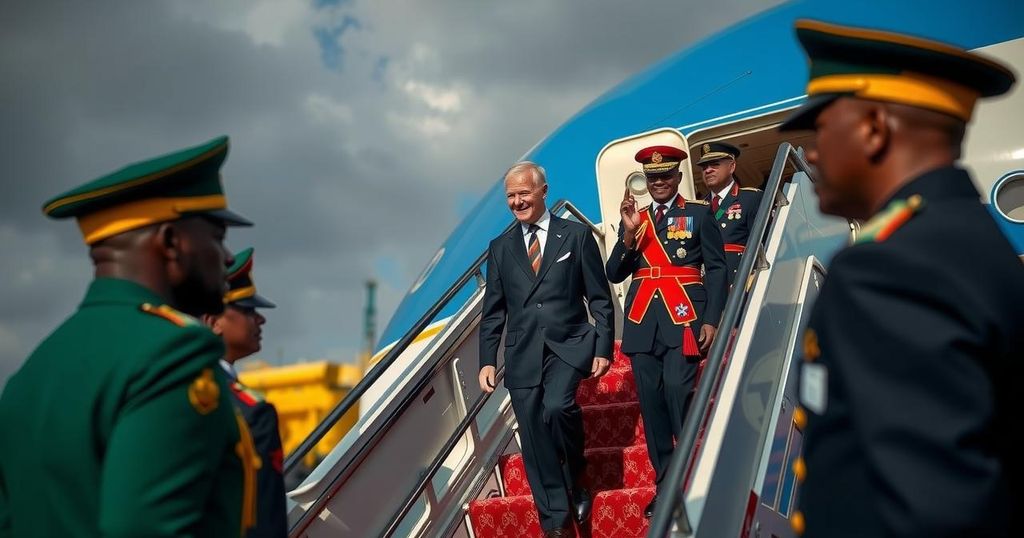President Biden arrives in Angola for his first presidential visit to sub-Saharan Africa, aimed at countering China’s influence through the Lobito Corridor railway project. The trip highlights U.S. interests in critical minerals crucial for clean energy and aims to strengthen ties with Angola, while addressing concerns about human rights in the country. The Lobito project represents a strategic investment by the U.S. to compete with China’s dominance in Africa.
President Joe Biden made a significant visit to Luanda, Angola, marking his inaugural presidential trip to sub-Saharan Africa. This three-day visit aims to bolster U.S. influence in the region, particularly through the Lobito Corridor railway redevelopment project in Zambia, Congo, and Angola. This initiative is designed to enhance U.S. relations and is crucial due to the region’s abundance of vital minerals essential for electric vehicles and clean energy technologies.
Upon arriving in Angola, President Biden was greeted by thousands of citizens lining the streets. His itinerary includes meetings with Angolan President João Lourenço, a visit to the National Slavery Museum, and an inspection of the Lobito port city’s railway project. The trip, initially delayed from last year, comes as Biden seeks to reinforce U.S. ties with Africa, a region often overshadowed by rising Chinese influence.
Historically, the last U.S. president to visit sub-Saharan Africa was Barack Obama in 2015. National security spokesman John Kirby emphasized that Biden’s focus on Africa has been consistent since he took office, countering the narrative that this is merely a late-in-term visit. The Lobito Corridor project, meriting $3 billion in U.S. investment and support from various international entities, represents a strategic effort to compete with China’s foothold in African critical minerals.
While the initiative aims to establish a U.S. presence amid China’s dominance, the future of the Lobito project may hinge on the policies of the subsequent administration led by President-elect Donald Trump. Experts express cautious optimism regarding the continuity of the project, provided it is framed as a vital countermeasure to Chinese influence in Africa.
During his visit, Biden plans to announce new collaborations in areas such as health, agribusiness, and security cooperation, while also reflecting on the evolving U.S.-Angola relationship, which has improved since the turbulent era of Angola’s civil war. Nevertheless, concerns regarding human rights within Angola will likely accompany his discussion of U.S. values in diplomacy, as international advocacy groups criticize the government’s authoritarian tendencies. Thus, these complex dynamics will accompany Biden’s engagement during this landmark visit to Africa.
President Joe Biden’s recent visit to Angola is a critical step in addressing U.S. interests in sub-Saharan Africa and countering China’s growing influence in the region. This visit coincides with the Lobito Corridor railway project, a strategic initiative expected to enhance American involvement in sectors reliant on critical minerals. The significance of this trip is magnified by the legacy of previous U.S. presidents’ engagements in Africa, as well as ongoing geopolitical struggles for resource control between the U.S. and China. Biden’s administration aims to strengthen ties through infrastructure investments, contrasting the Belt and Road Initiative spearheaded by China. With events leading up to this visit highlighting potential vulnerabilities in America’s foreign policy stance in Africa, Biden’s engagement underscores an attempt to revitalize U.S. interests on the continent amid criticisms regarding prioritization and human rights issues.
In summary, President Biden’s trip to Angola signifies a pivotal moment for U.S. diplomacy in sub-Saharan Africa, aimed at countering Chinese influence through significant investments in infrastructure and partnerships. Despite challenges posed by the prospect of a new administration, the Lobito Corridor project represents a strategic opportunity for the U.S. to regain footing in the region, addressing both economic needs and geopolitical competition. Nonetheless, human rights concerns in Angola will present a critical backdrop to these discussions, complicating America’s value-based diplomacy as it engages with African nations.
Original Source: www.mercurynews.com






